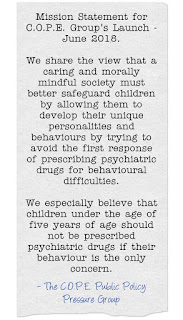Almost 1.5 million prescriptions for the drugs — used to tackle attention deficit hyperactivity disorder (ADHD) and to boost concentration — were dispensed by the NHS last year compared with fewer than 700,000 a decade earlier. The treatments are often referred to as chemical coshes.
Amanda Spielman, the head of Ofsted, said it was implausible that so many more young people were suffering from the attention disorder and needed medication to control their symptoms. “The fact that it seems to have become the norm for a whole swathe of the social structure to medicate as a response to behavioural problems feels like a very big warning signal,” she told The Times.
“If there’s that many behavioural problems, what is it telling us about what ought to be preventable? Is it located in the family? Is it located in the education or the peer group? You don’t just want to try to block out the symptoms, you want to say, is there something that can be solved?”
Other experts, including the child psychiatrist Mike Shooter, say that some parents seek a diagnosis because it reassures them that they are doing all they can to help their children. “It helps reduce the stigma of their child’s behaviour among family, friends and teachers,” he said. He called the diagnosis of attention disorder “very overdone”.
However, a mother from south London whose son was prescribed Ritalin at 11 said that it made school bearable. “Ritalin is not a silver bullet,” she said. “It did not solve all his problems, but after years of struggling at school it really helped. He could not sit still in the classroom and used to run out of the room. It really helped with those basic things. He would go on and off it . . . but when he was off, it was very reassuring to know it was there.”
There are fears that some middle-class parents exaggerate their children’s symptoms to get the drugs because they improve concentration, and their use often results in children getting 25 per cent more time to sit GCSEs and A levels. Ms Spielman said that pupils should not be taking medication to improve exam performance. “These are not exams designed for an Übermensch [superhuman] generation,” she said.
Medication may moderate behaviour, but some children taking it might simply need more attention at home, she suggested. She had been shocked by the “astonishingly high” number of children on medication in one Ofsted focus group in a deprived part of Essex. She emphasised, however, that the problem was not limited to the underprivileged.
Her comments come on the second day of The Times’s investigative series on Britain’s Lost Children, which has uncovered high levels of gang membership among youngsters. Youth workers say that young people in gangs are combining drugs such as Ritalin with cannabis — a combination that some fear could be fuelling knife crime.
The surge in prescriptions to treat the attention disorder in Britain mirrors the situation in the United States, where there was an 83 per cent rise in sales of the drug between 2006 and 2010.
The National Institute for Health and Care Excellence (Nice) estimates that about 500,000 schoolchildren — 5 per cent — have attention deficit hyperactivity disorder, with greater prevalence of the condition among looked-after children and those known to the Youth Justice Boards. It says that medication should be used as a last resort because of the risk of sleeplessness, weight loss and headaches.
Tony Lloyd, chief executive of the ADHD Foundation, said that it remained an undiagnosed problem but added: “ADHD medication helps children in terms of cognitive function — it does not teach morals, conscience, values or citizenship. There’s a real need for parents to understand what their responsibilities are.”















